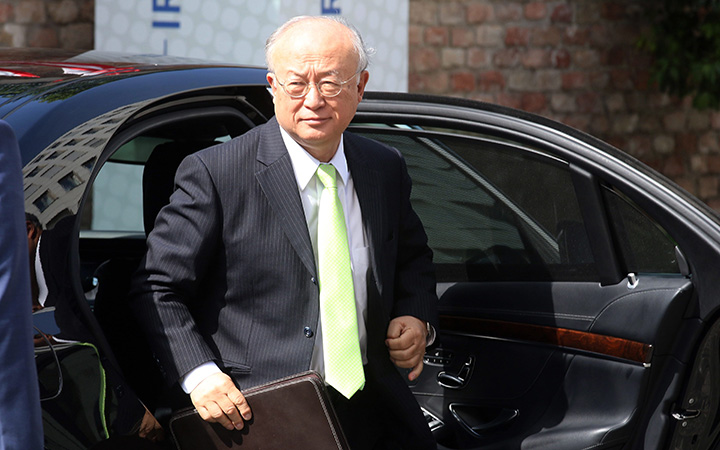VIENNA – The head of the UN agency tasked to monitor a nuclear deal with Iran will visit Tehran Thursday to meet with Iranian President Hassan Rouhani and discuss an impasse over interviewing experts he suspects may have worked on atomic arms, Iranian media report.

Yukiya Amano of the International Atomic Energy Agency will “receive Iran’s alternative proposal to nuclear scientists’ questioning,” said the reports Wednesday.
An IAEA probe of the allegations has been essentially stalemated for nearly a decade, with Iran dismissing them as phoney evidence planted by the U.S. and Israel.
READ MORE: Iran’s foreign minister returns to nuclear talks in Vienna
Washington insists that the agency be given greater powers in its investigations as part of any overall nuclear deal. That includes questioning people possibly involved in the alleged weapons work – something Tehran rejects.
The IAEA Wednesday had no immediate comment on the reported trip.
Amano will also reportedly meet with Ali Shamkhani, the secretary of Iran’s Supreme National Security Council.
The reported trip comes as world powers use the seven-day window created by Tuesday’s decision to extend negotiations on the nuclear deal amid differences on how much access Iran must give Amano’s agency and other disputes.
- Life in the forest: How Stanley Park’s longest resident survived a changing landscape
- ‘Love at first sight’: Snow leopard at Toronto Zoo pregnant for 1st time
- Carbon rebate labelling in bank deposits fuelling confusion, minister says
- Buzz kill? Gen Z less interested in coffee than older Canadians, survey shows
The State Department announced the extra days of talks only hours before the expiration of the target date for their completion. Thoughts of meeting the deadline had been long-abandoned, but the extension has added significance as it holds in place nuclear restrictions that Iran agreed to some 20 months ago as well as slightly eased conditions for Iranian business with the world.
READ MORE: World ‘closer than ever’ to Iran nuclear deal, Kerry says
The June 30 deadline day originally had been envisioned as the culmination of almost two years of negotiations aimed at assuring the world Iran cannot produce nuclear weapons, and providing the Iranian people a path of out of their international isolation.
But officials said over the weekend they were nowhere near a final accord, and Iran’s foreign minister had briefly flown back to his capital for further consultations amid increased signs of backtracking by his country’s supreme leader, Ayatollah Ali Khamenei.
In Washington, President Barack Obama there will be no nuclear deal with Iran if inspections and verification requirements are inadequate.
“I will walk away from the negotiations if, in fact, it’s a bad deal,” Obama told reporters.
The weeklong extension has political overtones as well. An agreement by July 7 would give the Obama administration time to submit the deal to Congress by July 9. Congress would then have 30 days to review it, during which time Obama would not be able to ease sanctions.
If negotiations drag on past July 9 without a deal, that congressional review period would extend to 60 days. If lawmakers were to build a veto-proof majority behind new legislation enacting new economic sanctions or preventing Obama from suspending existing ones, the administration would be prevented from living up to an accord.
Beyond the level of IAEA inspections on Iranian sites, significant disagreements persist on how quickly the West would roll back sanctions and what types of research and development Iran would be permitted to conduct on advanced nuclear technology.



Comments